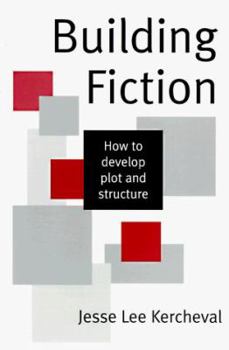Building Fiction: How to Develop Plot & Structure
Select Format
Select Condition 
Book Overview
No one looks at structure like Jesse Lee Kercheval. She builds a work of fiction just as an architect would design a house--with an eye for details and how all parts of a story or novel interconnect.... This description may be from another edition of this product.
Format:Paperback
Language:English
ISBN:1884910289
ISBN13:9781884910289
Release Date:January 1997
Publisher:Story Pr
Length:208 Pages
Weight:0.76 lbs.
Dimensions:9.3" x 0.8" x 6.3"
Customer Reviews
4 ratings
One of the best
Published by Thriftbooks.com User , 17 years ago
I frequently use this text in my classes. Building Fiction is the best book I've read in terms of explaining basic short story structure and epiphany. Kercheval illustrates many of the same concepts that Janet Burroway (a teacher of Kercheval's) uses in her famous textbooks, but here, the information is simpler and more distilled. I love the Burroway books, but they are difficult for most beginning students to fully grasp. And while I'm making a case for the Kercheval book's clarity and usefulness for beginners, as a published writer and university teacher, I also found the information personally helpful. I highly recommend this book. And in response to the review that found Building Fiction narcissistic and obvious---I think it can be engaging and helpful to read a writer's personal anecdotes and sometimes the obvious needs to be stated.
Excellent ideas for beginning & intermediate writers.
Published by Thriftbooks.com User , 25 years ago
Over the course of the 7 years I've been writing novel-length fiction, I've read dozens of how-to books. Frequently I've found those written by authors of "lit fic," such as Kercheval, to not be very useful to a writer of commercial, popular fiction. But Kercheval is a happy exception to this rule. I found her book clear and often very insightful on almost every aspect of the novel. Since discussing everything I liked would take too much space and time, I will limit myself to describing the aspect I found most valuable, Kercheval's discussion of conflict.I particularly liked what Kercheval has to say about "interior dialogue," aka "introspection," or what I often banefully call "musing." She talks about it as the strongest source of revealing internal conflict ("man against himself"), while action is the area in which external conflict ("man against man," "man against nature") is displayed. Of course many people have written about conflict before, but I think Kercheval's unique contribution is the very clear way she explains how one can visualize the resolution of the internal and external conflict. To wit: that the external crisis in a novel cannot be resolved until after the internal crisis is resolved. I liked her statement in this regard that the internal crisis is the moment the protagonist decides to take the action which can potentially resolve the external conflict. This was, to me, a very thought-provoking way of describing what is traditionally known as the "come to realize" moment which follows the "black moment" of a novel. She suggests that often this moment of internal insight involves the protagonist ceasing to be stuck in the belief that people (including him/herself) can't change. Once the protagonist realizes that he/she *can* change, this permits the growth that allows the character to reframe his/her thinking so as to allow new possibilities for action to occur. The action, as mentioned above, which leads to the resolution of the external conflict.Finally, I found Kercheval's explanation of the internal conflict techniques of flashbacks, dreams and visions quite useful. In particular, I hadn't thought of the use of visions as a useful technique in popular fiction before, and her analysis of it gave me new food for thought.
A Perfect Guide for New Writers
Published by Thriftbooks.com User , 26 years ago
Jesse Kercheval has written a book to help novice writers gain a foothold and begin crafting the sort of fiction that will keep readers turning pages. This book is like a self-contained writing course--examining basics like opening hooks, point of view, conflict, and characterization with a clear, readable style.Building Fiction probably doesn't offer much by way of new advice for anyone beyond the rank of beginner, but if you're ready to explore writing and publication, it offers an excellent starting point. I'll be using it as a text for beginning writing classes in the future.
Good advice
Published by Thriftbooks.com User , 26 years ago
I picked up this book at my local book shop, and read it all the way home. The advice from this book has greatly helped out my story. Get this book.






